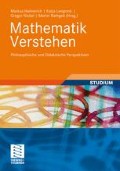Zusammenfassung
Dieses Zitat des britischen Mathematikers G. H. Hardy bringt pointiert die unter praktizierenden Mathematikern, aber auch unter Philosophen der Mathematik weithin akzeptierte Ansicht zum Ausdruck, dass mathematische Schönheit eine nicht zu vernachlässigende Rolle in der mathematischen Forschungspraxis spielt und sowohl interessante ästhetiktheoretische, epistemische als auch ontologische Aspekte aufweist. Danach beeinflusst also das Verständnis dessen, was mathematische Schönheit ist, auch das Verständnis dessen, was Mathematik ist: „Was sind die Träger mathematischer Schönheit?“ ist die Frage nach der Art der Gegenstände, für deren Schönheit Mathematiker sich begeistern und nach der sie streben. „Was sind die Kriterien für mathematische Schönheit?“ ist die Frage nach den Kategorien, unter denen Mathematiker ihre Arbeit bewerten. Egal, ob sich das Phänomen mathematischer Schönheit als Ausnahmemerkmal oder als ständiger Begleiter mathematischen Tuns erweist – ein adäquates allgemeines Mathematikverständnis sollte dieses Phänomen berücksichtigen und bestenfalls auch erklären können.
Access this chapter
Tax calculation will be finalised at checkout
Purchases are for personal use only
Preview
Unable to display preview. Download preview PDF.
Literatur
Aigner, M.; Ziegler, G. M.: Das BUCH der Beweise. Berlin, 2002.
Birkhoff, G.: Aesthetic Measure. Harvard University Press, Cambridge, 1933.
Borel, A.: Mathematik: Kunst und Wissenschaft. (2. Aufl.) München, 1981.
Chaitin, G.: Conversation with a Mathematician. Math, Art, Schience and the Limits of Reason. London, 2002.
Davis, P. J.; Hersh, R.; Marchisotto, E. A. (Hrsg.): The Mathematical Experience. Boston, 1994 (1981).
Devlin, K.: Muster derMathematik. Ordnungsgesetze des Geistes und der Natur. Heidelberg/Berlin, 2002.
Hardy, G. H.: A mathematician’s Apology. Campridge, 1940.
Hasse, H.: Mathematik als Wissenschaft, Kunst und Macht. Wiesbaden, 1952.
Heintz, B.: Die Innenwelt der Mathematik. Zur Kultur und Praxis einer beweisenden Disziplin. Wien, 2000.
Kant, I.: Kritik der Urteilskraft.
King, J. P.: The Art of Mathematics. New York, 1992.
Löwe, B.; Müller, T.; Müller-Hill, E.: Mathematical knowledge: a case study in empirical philosophy of mathematics. Erscheint in: Van Kerkhove, B. et al. (Hrsg.): Philosophical Perspectices on Mathematical Practice. London, 2009.
McAllister, J.W.: Mathematical Beauty and the Evolution of Standards of Mathematical Proof. In: Emmer, M.. (Hrsg.): The Visual Mind II. Cambridge (u.a.), 2005. S. 15–34.
Müller-Hill, E.: Mathematisches Wissen, Beweise und Degrees of Proofness. In: Witzke, Ingo. (Hrsg.): Mathematical Practice and Development Throughout History: Proceeding of the 18th Novembertagung on the History, Philosophy and Didactics of Mathematics. Berlin, 2009. S. 205–227.
Müller-Hill, E.: Formalizability and knowledge ascriptions in mathematical practice. In: Philosophia Scientiae, 13 (2). S. 21–43.
Müller-Hill, Die epistemische Rolle formalisierbarer mathematischer Beweise. Formalisierbarkeitsbasierte Konzeptionen mathematischen Wissens und mathematischer Rechtfertigung innerhalb einer sozio-empirisch informierten Erkenntnistheorie der Mathematik. Dissertation, in Vorbereitung.
Netz, R.: The Aesthetics of Mathematics: A Study. In: Mancosu, P.; Jorgensen, K. F.; Pedersen, S. A. (Hrsg.): Visualization, Explanation and Reasoning Styles in Mathematics. Dortrecht, 2005, S. 251–293.
Rota, G.-C.: Indiscrete Thoughts. Boston, 1997.
Ruelle, D.: The Mathematician’s Brain. Princeton, 2007.
Sinclair, N.: The Aesthetic Sensibilities of Mathematicians. In: Sinclair/Pimm/Higginson. (Hrsg.): Mathematics and the Aesthetic. New Approaches to an Ancient Affinity. New York, 2006.
Tymoczko, T.: Value Judgments in Mathematics: Can We treat Mathematics as an Art? In: White, A.. (Hrsg.): Essays in Humanistic Mathematics. Washington, 1993. S. 67–77.
Wells, D.: Are These the Most Beautiful? In: The mathematical Intelligencer, 12/3. New York, 1990.
Wells, D.: Which is the Most Beautiful? In: The mathematical Intelligencer, 10/4. New York, 1988.
Weth, T.: Die Schönheit in der Mathematik. In: Lauter, M.; Weigand, H.-G.. (Hrsg.): Ausgerechnet …Mathematik und Konkrete Kunst. Würzburg, 2007. S. 68–72.
Author information
Authors and Affiliations
Editor information
Editors and Affiliations
Rights and permissions
Copyright information
© 2011 Vieweg+Teubner Verlag | Springer Fachmedien Wiesbaden GmbH
About this chapter
Cite this chapter
Müller-Hill, E., Spies, S. (2011). Der Begriff mathematischer Schönheit in einer empirisch informierten Ästhetik der Mathematik. In: Helmerich, M., Lengnink, K., Nickel, G., Rathgeb, M. (eds) Mathematik Verstehen. Vieweg+Teubner. https://doi.org/10.1007/978-3-8348-9836-4_21
Download citation
DOI: https://doi.org/10.1007/978-3-8348-9836-4_21
Publisher Name: Vieweg+Teubner
Print ISBN: 978-3-8348-1395-4
Online ISBN: 978-3-8348-9836-4
eBook Packages: Life Science and Basic Disciplines (German Language)

